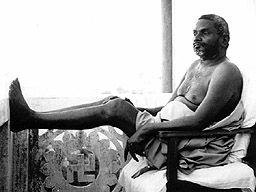The Movement Center presents Nityananda.us
Devotees' Stories
AT THE PALANI TEMPLE
One of the few authenticated stories from the time before Nityananda settled in Ganeshpuri takes place at the Palani Temple. There Lord Subramanya, a brother of Lord Ganesh in Hindu mythology, is the presiding deity. In those days, Nityananda looked like an eccentric wanderer, his wire-thin body healthy and glowing. Late one morning he was ascending the last few steps to the shrine when the attendant priest, having just locked the doors after morning worship, was descending. Nityananda asked him to re-open the doors and wave a ritual light and incense (arati) before the deity. Astonished that a vagrant would dare make such a request, the priest curtly told Nityananda that the time for morning worship was over.
Nityananda continued on. The priest, expecting him to walk around the shrine and worship at the Muslim altar in the back, was not concerned until he heard the temple bells ringing. Turning, he was astonished to see the doors open, Nityananda sitting in the deity’s place, and arati being waved before him by invisible hands. The vision vanished at once, and Nityananda left the shrine to stand on one leg for some time, steadily gazing upward. Coins poured at his feet, offered, some say, by pilgrims, while others say by an unseen source. In any case, he was accorded all the honors of a Master. When the surrounding pilgrims begged him to stay, he refused and instructed them to use the money to provide a daily meal of rice porridge to visiting renunciates. It was later learned that local sannyasis had been praying for this very thing.
Leaving the Pantalayani area, the young Master encountered an errant gang of youths in Cannanore. One of them wrapped a kerosene-soaked rag on the Master’s left hand and set it ablaze. Nityananda didn’t resist physically but instead transferred the burning sensation to the one who had attacked him. Crying out in pain, the unexpected victim begged for mercy. As Nityananda extinguished the fire on his own hand, the sensation in the other’s subsided. Years later, he explained to devotees:
Those with inner wisdom (jnanis) do not go in for miracles. However, this does not mean that a burning rag tied to their hands does not hurt. They suffer like anyone else but have the capacity to detach their minds completely from the nerve centers. In this way they might remember the pain only once or twice a day.
